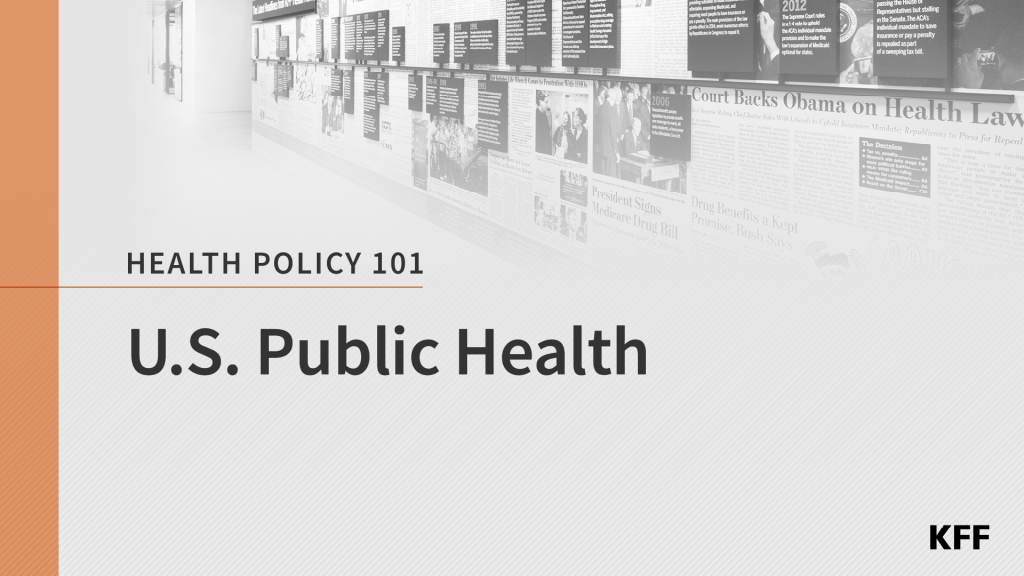The HIV/AIDS Epidemic in the United States: The Basics
This updated fact sheet provides the latest data on the U.S. HIV epidemic, including key trends over time, impact by region and population, and information on the U.S. government's response.
The independent source for health policy research, polling, and news.
KFF’s policy research provides facts and analysis on a wide range of policy issues and public programs.
KFF designs, conducts and analyzes original public opinion and survey research on Americans’ attitudes, knowledge, and experiences with the health care system to help amplify the public’s voice in major national debates.
KFF Health News is a national newsroom that produces in-depth journalism about health issues and is one of the organization’s core operating programs.
Health Policy 101 is a comprehensive guide covering fundamental aspects of U.S. health policy and programs, including Medicare, Medicaid, the Affordable Care Act, employer-sponsored insurance, the uninsured population, health care costs and affordability, women's health issues, and health care politics. The Public Health chapter examines how public health is governed and delivered in the United States. It includes explanations of key public health frameworks, services, capabilities and characteristics, how the public health system works in state, local and territorial governments, and public health funding, workforce, and communication challenges in an era of declining trust.
This updated fact sheet provides the latest data on the U.S. HIV epidemic, including key trends over time, impact by region and population, and information on the U.S. government's response.
KFF's Health Misinformation Tracking Poll finds that while most adults say they have interacted with artificial intelligence (AI), most are not confident that these chatbots provide accurate health information. Most of the public, and half of AI users, are not confident they can tell whether information from AI chatbots is true or false
In this Monitor, we explore how ongoing misinformation about the safety and efficacy of COVID-19 vaccines may affect the acceptance of new vaccine recommendations. First, we examine the false and misleading claims underlying the Kansas Attorney General’s lawsuit against Pfizer. We also discuss the CDC’s most recent vaccine.
Firearm deaths increased sharply over the past decade, rising from 92 deaths per day to 132 deaths per day from 2012 to 2022. Firearms are the leading cause of total suicides and homicides, making up 55% of all suicide deaths and 79% of all homicides in 2022.
This volume explores narratives linking vaccines to autism and misleading claims about the benefits of raw milk. It examines how trust and perceived expertise influence misinformation and AI's role in spreading false mental health information.
This Issue Brief reviews the federal role in setting U.S. water fluoridation policies, discusses current federal recommendations for water fluoridation, and summarizes the extent of water fluoridation across U.S. states.
This policy brief highlights areas in which HHS, FDA, and CDC have authority to shape U.S. vaccine policy with a specific focus on vaccine approvals and recommendations for the public. Ultimately, while there are limits, federal officials have significant authority to influence and alter vaccine policy, which could affect vaccine availability, views about vaccines, and vaccine use in the U.S. However, this does not include imposing mandates on or changing local vaccination requirements, as those authorities rest with state and local governments.
This edition focuses on intentionally false or misleading information online and its potential impact on public trust in health care. We share a recent report that exposed a covert U.S. military social media disinformation campaign in the Philippines that may have undermined public confidence in vaccines. We also examine how false claims about sunscreen and non-FDA-approved "miracle cures" may be discouraging people from taking important preventative measures and seeking legitimate medical treatment. Finally, we explore the rise of counterfeit diabetes and weight-loss drugs like Ozempic and the potential impact on trust in the pharmaceutical supply chain.
This first edition of the Health Misinformation Monitor explores misinformation about raw milk amid bird flu outbreaks on dairy farms, false vaccine narratives that continue to spread, and legal challenges against abortion pill reversal claims. Additionally, a growing number of states have required public schools to show fetal development videos that some have called biased and inaccurate. This Monitor report also provides a snapshot of new KFF misinformation polling on TikTok and discusses the early challenges faced by The World Health Organization’s new AI tool SARAH in providing accurate answers to health questions.
This analysis uses data on “animal production workers” from the 2022 American Community Survey to examine characteristics of workers who may be at risk for exposure to H5N1 avian influenza, which has been found in dairy cattle herds in nine U.S. states as of May 14, 2024. The analysis compares characteristics of these workers to all U.S. workers, to all workers in the H5N1-affected states, and draws out some implications. Among the findings are that animal production workers are more likely than workers overall to be Hispanic and noncitizen immigrants, as well as to be uninsured.
© 2026 KFF
